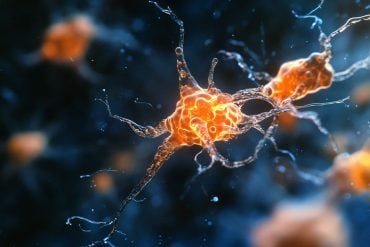Summary: According to a new study, older people who engage in sexual activity on a frequent basis scored higher on tests that reflect cognitive abilities.
Source: Coventry University.
More frequent sexual activity has been linked to improved brain function in older adults, according to a study by the universities of Coventry and Oxford.
Researchers found that people who engaged in more regular sexual activity scored higher on tests that measured their verbal fluency and their ability to visually perceive objects and the spaces between them.
The study, published today in The Journals of Gerontology, Series B: Psychological and Social Sciences, involved 73 people aged between 50 and 83.
Participants filled in a questionnaire on how often, on average, they had engaged in sexual activity over the past 12 months – whether that was never, monthly or weekly – as well as answering questions about their general health and lifestyle.
The 28 men and 45 women also took part in a standardised test, which is typically used to measure different patterns of brain function in older adults, focussing on attention, memory, fluency, language and visuospatial ability.
This included verbal fluency tests in which participants had 60 seconds to name as many animals as possible, and then to say as many words beginning with F as they could – tests which reflect higher cognitive abilities.
They also took part in tests to determine their visuospatial ability which included copying a complex design and drawing a clock face from memory.
It was these two sets of tests where participants who engaged in weekly sexual activity scored the most highly, with the verbal fluency tests showing the strongest effect.
The results suggested that frequency of sexual activity was not linked to attention, memory or language. In these tests, the participants performed just as well regardless of whether they reported weekly, monthly or no sexual activity.
This study expanded on previous research from 2016, which found that older adults who were sexually active scored higher on cognitive tests than those who were not sexually active.
But this time the research looked more specifically at the impact of the frequency of sexual activity (i.e. does it make a difference how often you engage in sexual activity) and also used a broader range of tests to investigate different areas of cognitive function.
The academics say further research could look at how biological elements, such as dopamine and oxytocin, could influence the relationship between sexual activity and brain function to give a fuller explanation of their findings.

Lead researcher Dr Hayley Wright, from Coventry University’s Centre for Research in Psychology, Behaviour and Achievement, said:
“We can only speculate whether this is driven by social or physical elements – but an area we would like to research further is the biological mechanisms that may influence this.
“Every time we do another piece of research we are getting a little bit closer to understanding why this association exists at all, what the underlying mechanisms are, and whether there is a ‘cause and effect’ relationship between sexual activity and cognitive function in older people.
“People don’t like to think that older people have sex – but we need to challenge this conception at a societal level and look at what impact sexual activity can have on those aged 50 and over, beyond the known effects on sexual health and general wellbeing.”
Source: Coventry University
Image Source: NeuroscienceNews.com image is in the public domain.
Original Research: Full open access research for “Frequent sexual activity predicts specific cognitive abilities in older adults” by Hayley Wright, Rebecca A. Jenks, and Nele Demeyere in The Journals of Gerontology, Series B. Published online June 21 2017 doi:10.1093/geronb/gbx065
[cbtabs][cbtab title=”MLA”]Coventry University “Frequent Sexual Activity Can Boost Brain Power in Older Adults.” NeuroscienceNews. NeuroscienceNews, 22 June 2017.
<https://neurosciencenews.com/aging-brain-sex-6960/>.[/cbtab][cbtab title=”APA”]Coventry University (2017, June 22). Frequent Sexual Activity Can Boost Brain Power in Older Adults. NeuroscienceNew. Retrieved June 22, 2017 from https://neurosciencenews.com/aging-brain-sex-6960/[/cbtab][cbtab title=”Chicago”]Coventry University “Frequent Sexual Activity Can Boost Brain Power in Older Adults.” https://neurosciencenews.com/aging-brain-sex-6960/ (accessed June 22, 2017).[/cbtab][/cbtabs]
Abstract
Frequent sexual activity predicts specific cognitive abilities in older adults
Objectives:
This study replicates and extends the findings of previous research (Wright, H., & Jenks, R. A. (2016). Sex on the brain! Associations between sexual activity and cognitive function in older age. Age and Ageing, 45, 313–317. doi:10.1093/ageing/afv197) which found a significant association between sexual activity (SA) and cognitive function in older adults. Specifically, this study aimed to generalize these findings to a range of cognitive domains, and to assess whether increasing SA frequency is associated with increasing scores on a variety of cognitive tasks.
Methods:
Seventy-three participants aged 50–83 years took part in the study (38.4% male, 61.6% female). Participants completed the Addenbrooke’s Cognitive Examination-III (ACE-III) cognitive assessment and a questionnaire on SA frequency (never, monthly, or weekly), and general health and lifestyle.
Results:
Weekly SA was a significant predictor of total ACE-III, fluency, and visuospatial scores in regression models, including age, gender, education, and cardiovascular health.
Discussion:
Greater frequency of SA was associated with better overall ACE-III scores and scores on subtests of verbal fluency and visuospatial ability. Both of these tasks involve working memory and executive function, and links between sexual behavior, memory, and dopamine are discussed. The findings have implications for the maintenance of intimate relationships in later life.
“Frequent sexual activity predicts specific cognitive abilities in older adults” by Hayley Wright, Rebecca A. Jenks, and Nele Demeyere in The Journals of Gerontology, Series B. Published online June 21 2017 doi:10.1093/geronb/gbx065






